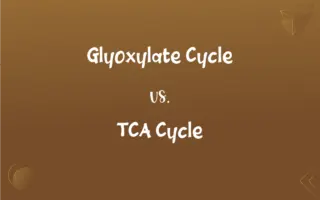Pasteurized Milk vs. Unpasteurized Milk: What's the Difference?
Edited by Aimie Carlson || By Harlon Moss || Published on February 23, 2024
Pasteurized Milk is milk heat-treated to kill bacteria and extend shelf life. Unpasteurized Milk is milk in its raw form, without undergoing heat treatment.

Key Differences
Pasteurized Milk is heated to a specific temperature to kill harmful bacteria. Unpasteurized Milk, also known as raw milk, retains its natural bacteria as it hasn't been heat-treated.
Pasteurized Milk has a longer shelf life due to the elimination of microbes. Unpasteurized Milk has a shorter shelf life and can spoil more quickly.
Pasteurized Milk is considered safer for consumption, especially for vulnerable populations. Unpasteurized Milk may contain pathogens that can cause illness.
Pasteurized Milk often undergoes homogenization, a process that further alters it. Unpasteurized Milk maintains its natural fat composition and layers.
Pasteurized Milk is widely available and recommended for general consumption. Unpasteurized Milk is regulated or restricted in many regions due to health concerns.
ADVERTISEMENT
Comparison Chart
Treatment Process
Heated to kill bacteria
No heat treatment; retains natural state
Shelf Life
Longer due to pasteurization
Shorter, spoils quickly
Safety
Safer due to reduced bacteria
Risk of pathogens and illness
Nutritional Alteration
Some nutrients altered by heat
Maintains original nutrient content
Legal Availability
Widely available and regulated
Restricted or regulated in many areas
ADVERTISEMENT
Pasteurized Milk and Unpasteurized Milk Definitions
Pasteurized Milk
Milk altered for health standards.
Pasteurized milk undergoes strict health regulations.
Unpasteurized Milk
Milk without any heat treatment.
Unpasteurized milk has a richer taste.
Pasteurized Milk
Milk processed for safety and longer shelf life.
The pasteurized milk lasted longer in the fridge.
Unpasteurized Milk
Raw milk with all its original nutrients.
Some believe unpasteurized milk has more health benefits.
Pasteurized Milk
Milk treated to make it safe for all consumers.
Pasteurized milk is recommended for young children.
Unpasteurized Milk
Milk directly from the animal without processing.
They used unpasteurized milk for traditional cheese making.
Pasteurized Milk
Milk heated to destroy harmful bacteria.
I always buy pasteurized milk for my family.
Unpasteurized Milk
Milk in its natural, raw state.
The farmer offered fresh unpasteurized milk.
Pasteurized Milk
Commonly available milk in grocery stores.
Most supermarkets stock only pasteurized milk.
Unpasteurized Milk
Milk that may contain natural bacteria.
Unpasteurized milk is not recommended for everyone.
FAQs
What is pasteurized milk?
Milk heat-treated to kill harmful bacteria.
Why is milk pasteurized?
To ensure safety by killing bacteria.
Does unpasteurized milk have more nutrients?
It retains its original nutrients but the differences are minimal.
Is pasteurized milk safer?
Yes, it's safer for general consumption.
Does pasteurization change milk’s taste?
It can slightly alter the taste.
Is pasteurized milk good for infants?
Yes, it's recommended over unpasteurized milk.
Why do some prefer unpasteurized milk?
For its natural taste and perceived health benefits.
Is pasteurized milk available globally?
Yes, it's the standard in most countries.
Can unpasteurized milk cause illness?
Yes, due to potential harmful bacteria.
How long does pasteurized milk last?
Generally longer than unpasteurized milk.
Can you buy unpasteurized milk legally?
It depends on regional laws and regulations.
Does pasteurization kill all bacteria in milk?
Most harmful bacteria, but not all microorganisms.
What is unpasteurized milk?
Milk in its raw, natural state without heat treatment.
What are the risks of drinking unpasteurized milk?
Risk of bacterial infections like E. coli or salmonella.
Does pasteurization affect milk’s calcium content?
No, calcium is not affected by the heat treatment.
How is pasteurized milk labeled?
Usually clearly marked as “pasteurized” on packaging.
Can unpasteurized milk be used for cheese making?
Yes, some traditional cheeses are made from it.
Is unpasteurized milk legal in the U.S.?
Its legality varies by state.
Can unpasteurized milk be pasteurized at home?
Technically yes, but home pasteurization is not recommended.
Can lactose-intolerant individuals consume unpasteurized milk?
No, it still contains lactose.
About Author
Written by
Harlon MossHarlon is a seasoned quality moderator and accomplished content writer for Difference Wiki. An alumnus of the prestigious University of California, he earned his degree in Computer Science. Leveraging his academic background, Harlon brings a meticulous and informed perspective to his work, ensuring content accuracy and excellence.
Edited by
Aimie CarlsonAimie Carlson, holding a master's degree in English literature, is a fervent English language enthusiast. She lends her writing talents to Difference Wiki, a prominent website that specializes in comparisons, offering readers insightful analyses that both captivate and inform.




































































